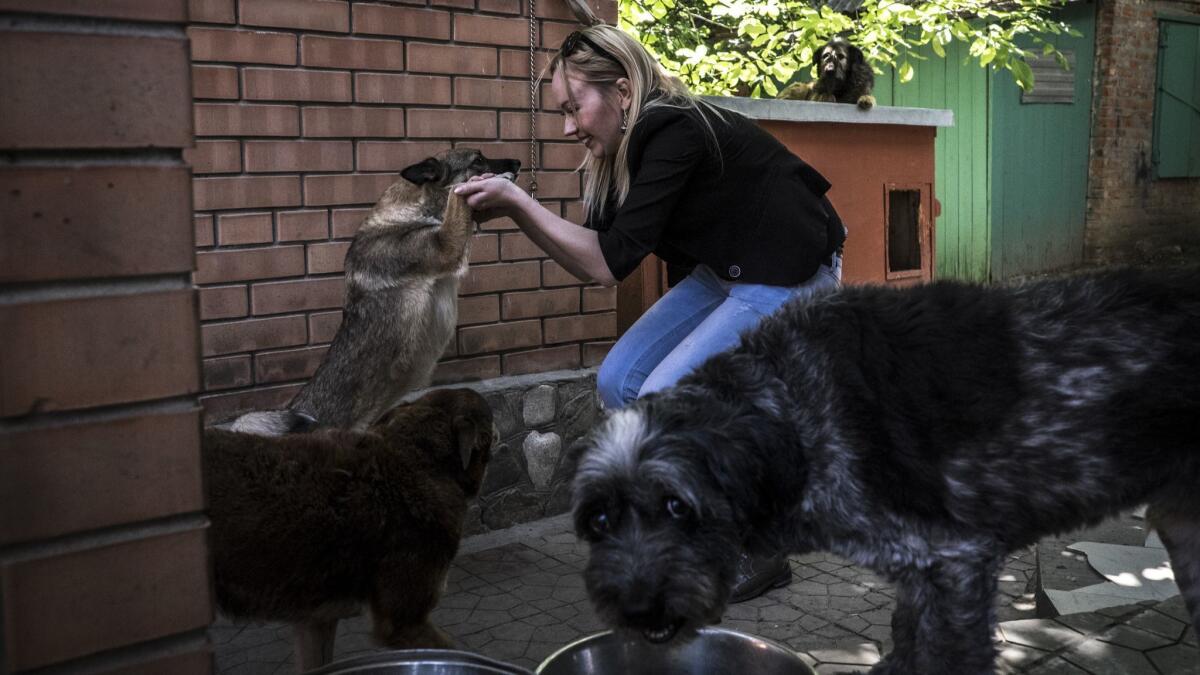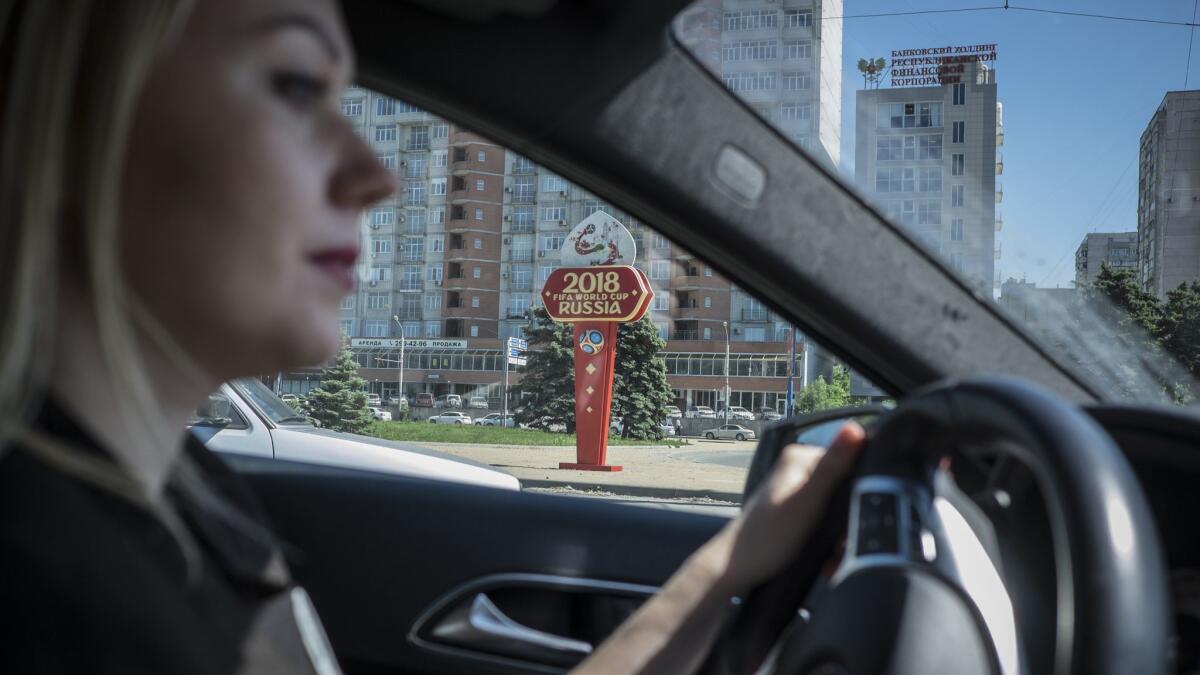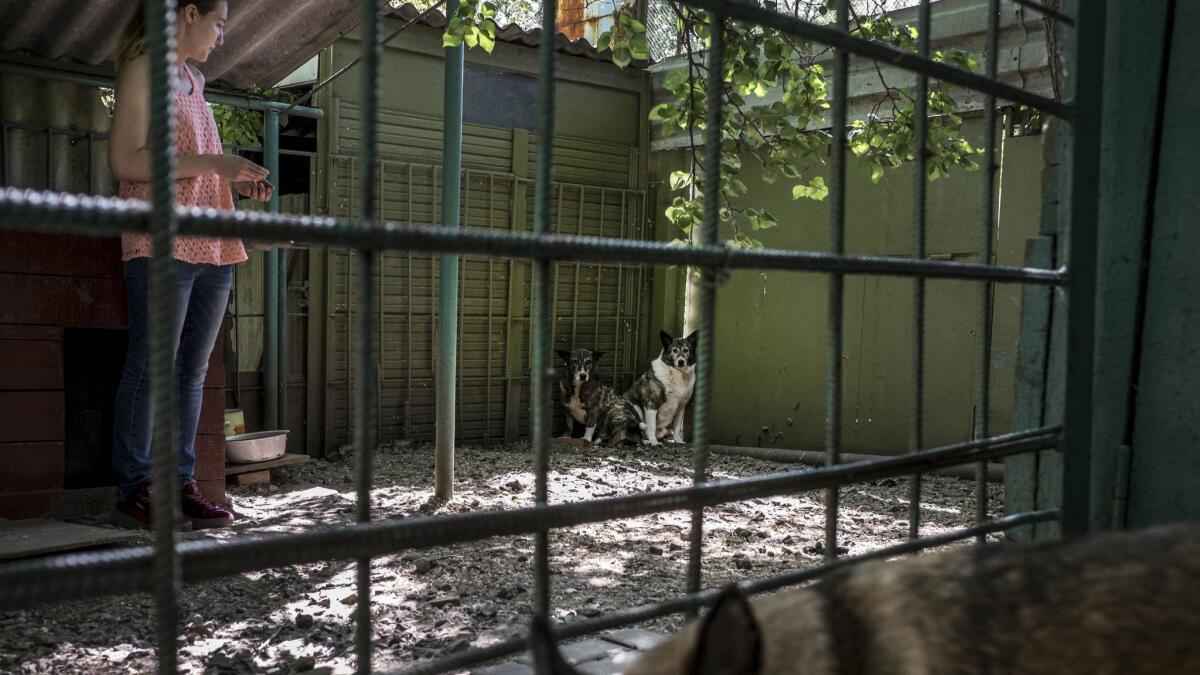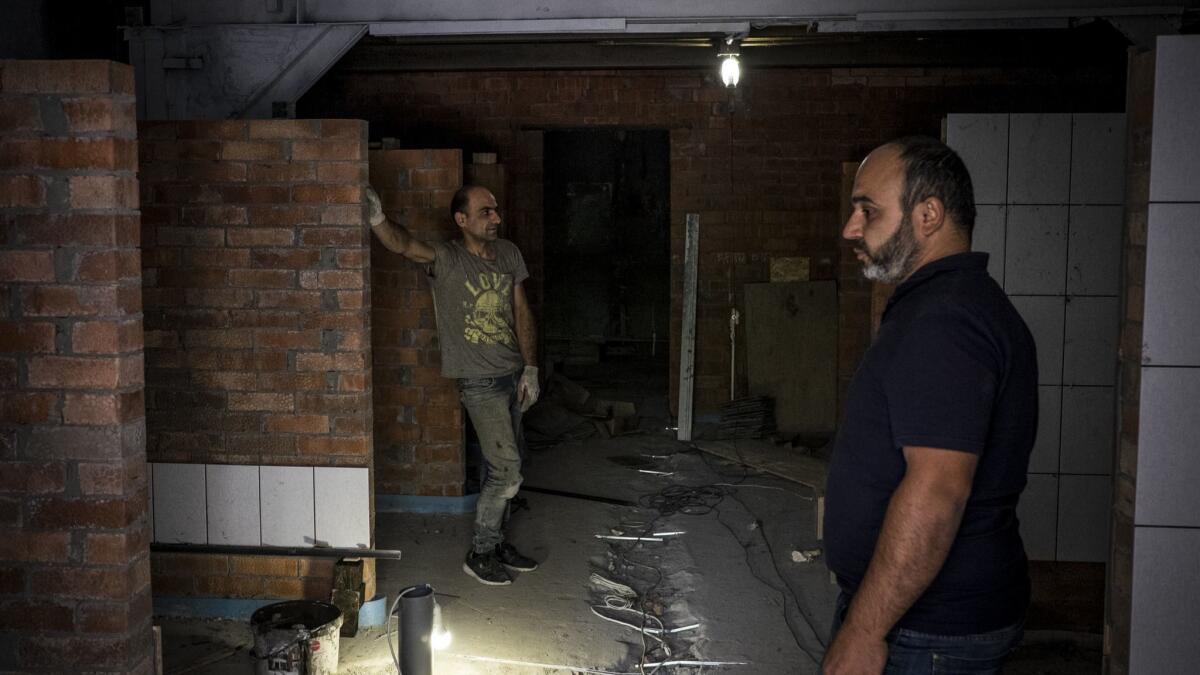To prepare for soccerâs World Cup, Russia is killing stray dogs. Animal-rights activists are fighting back

Reporting from Rostov-on-Don, Russia â Whenever the Rostov-on-Don municipal government issues tenders to kill thousands of the cityâs stray dogs, as it does from time to time, Katya Kuzmenko springs into action.
An animal-welfare activist with four cats at home and a handful of neighborhood street dogs dependent on her daily feedings, Kuzmenko is especially busy these days. With the World Cup soccer championships coming to Russia starting next week, Rostov-on-Don is among a number of host cities that is determined to kill its stray dogs.
Two years ago, Kuzmenko got an online degree in government procurement and contracts regulations so she could learn how to challenge the governmentâs practice of poisoning stray animals.
Kuzmenko combs through the tenders line-by-line as soon as the municipality posts them on the public procurement website. She files complaints against any violations in the language or structure of the proposal. Kuzmenko said her complaints have forced the municipal government to withdraw dozens of tenders that would have killed thousands of the cityâs estimated 10,000 stray dogs.
But these are small victories in what animal-rights groups say is a larger war being fought to push Russia to adopt federal laws to protect animals.
âItâs not normal in the 21st century that we are killing dogs and cats on the street like this,â Kuzmenko said. âThey say a nation should be judged by how it treats its animals. Look at what we are doing. Itâs shameful.â
The practice of killing Russiaâs strays gained international attention in 2014 before the Sochi Winter Olympics, when global animal-welfare advocacy groups issued pleas to the cityâs government to stop what they said was an inhumane and ineffective method of controlling homeless animals.
Now, with the FIFA World Cup starting June 14, the issue is again in focus after seven of the 11 host cities issued calls to kill street dogs ahead of the games.
Russia has a problem with strays, and Rostov-on-Don, like a majority of Russian cities, conducts an annual culling of the packs that roam neighborhoods foraging for food and protecting their territory. Some dogs spend their entire lives being cared for by neighbors who share the common yard of a large, Soviet-era concrete housing block in the city. Other dogs avoid humans angered at their late night bouts of barking.
Government contracts pay as much as $160,000 to kill thousands of stray animals under the guidelines of each tender. The methods of killing vary by contractor. Some shoot the animals with poison darts and leave them to die slowly, and, animal-welfare activists say, painfully. Other contractors catch the animals, euthanize them and cremate the bodies.
Several international organizations wrote letters to the host city governments, urging them to try a catch-and-release sterilization program instead.
One such group, Humane Society International, said its letters went unanswered. Yekaterinburg, a city of 1.3 million on the edge of the Ural Mountains, was the only municipality out of the 11 that responded to the People for the Ethical Treatment of Animals (PETA). The letter from the city administration said the suggested sterilization program would not work because âthe existing rules are humane and work well.â

Only four host cities â Moscow, St. Petersburg, Nizhny Novgorod and Kaliningrad â have a policy against killing strays. The other seven cities contract âdog hunters,â as they are called in Russia, to kill the strays.
âThis year in Sochi, we have the same situation as we did before the 2014 Olympics,â said Andrzej Pazgan, the Eastern European coordinator for PETA. âIf mass cullings were effective, we wouldnât have the same problem four years later.â
PETA and Humane Society International both advocate a sterilization program that releases the strays back into their territory once they are spayed or neutered and vaccinated.
âIn any given country, if there are growing numbers of dogs in the street and you arenât addressing the situation with some sort of humane and sustainable method of reduction, it just maintains the numbers or increases [them],â said Kelly OâMeara, a vice president at Humane Society International.

There is no animal-welfare legislation in Russia. A draft law has languished in the Russian parliament, the Duma, for more than seven years, with no lawmakers showing interest in raising the issue. A clause in Russiaâs criminal code does allow for prosecution in cases of killing or torturing animals by âsadisticâ means. Even those cases can be tough to prove: Russian law enforcement does not routinely handle cases of animal abuse or neglect.
Russians do love their pets, and give them diminutive names just like any loving pet owner. Fashionable breeds like pugs and corgis are popular in Moscow and other metropolitan areas. So is any teacup breed that can be carried in a purse to one of Moscowâs posh cafes. Adoption fairs sponsored by local charities have become more common, as have social media sites that post photos and stories of dogs needing homes.
But while there are plenty of responsible pet owners in Russia, there is not a culture of sterilizing or vaccinating pets, particularly those that are used as guard dogs at summer cottages, or dachas, said Ekaterina Dmitrieva of the Urban Animal Protection Fund in Moscow. In addition, Russia doesnât require veterinarians to be licensed or registered with the government, she added.
âAnimals are considered property, they are not considered to have any rights to protection in Russia,â Dmitrieva said.
It has been a challenge also to get Russians active in advocating for animal-welfare laws, Dmitrieva said.
âWhen you tell people that the Russian government pays people to kill stray animals, at first they canât even believe what you are saying,â she said. âBut then they ask me, âWhy should we care about these street dogs when we humans have enough problems of our own?â â
Russiaâs civil society is weak under President Vladimir Putinâs authoritarian rule. Environmental and human-rights groups are subjected to Kremlin pressure. In 2012, Russia passed a law requiring organizations that cooperate with or take money from international groups to register as âforeign agents,â a stigma many organizations, including Dmitrievaâs, donât want to risk.
While federal legislation may be a long way off, some Russian activists, like Kuzmenko, have made slow progress in their communities. Sixteen months after finishing her certificate course, sheâs managed to persuade the government office issuing tenders to consult with her before making them public.

Kuzmenko is part of a nonprofit organization called Dog Patrol, which is raising funds to build a nongovernmental animal shelter in an old printing press warehouse on the outskirts of Rostov. The 8,600-square-foot facility will have surgical rooms, where homeless dogs and cats can be sterilized and vaccinated. Dogs will recuperate in individual bays before being released back to their territory in the city. The group plans eventually to add an adoption service to the facility.
âThe government doesnât fully understand the problem or how to solve it, so they just think itâs cheaper to kill them,â said Sergei Menshikov, another member of the Dog Patrol, speaking of the cityâs large stray population.
Once completed, the facility will be equipped to sterilize 400 dogs a month, at an estimated cost of $19,300, Menshikov said. âAt that rate, we could sterilize about 80% of the stray dog population in the city in two years,â he said.
Russia is in need of a national campaign to educate pet owners about how to maintain healthy, domesticated animals, Humane Society Internationalâs OâMeara said.
âThis is a story about humans, too,â OâMeara said. âAs long as you have people buying dogs as pets and then abandoning them, unsterilized, the cycle keeps repeating itself.â
Twitter: @sabraayres
Ayres is a special correspondent.
More to Read
Sign up for Essential California
The most important California stories and recommendations in your inbox every morning.
You may occasionally receive promotional content from the Los Angeles Times.











